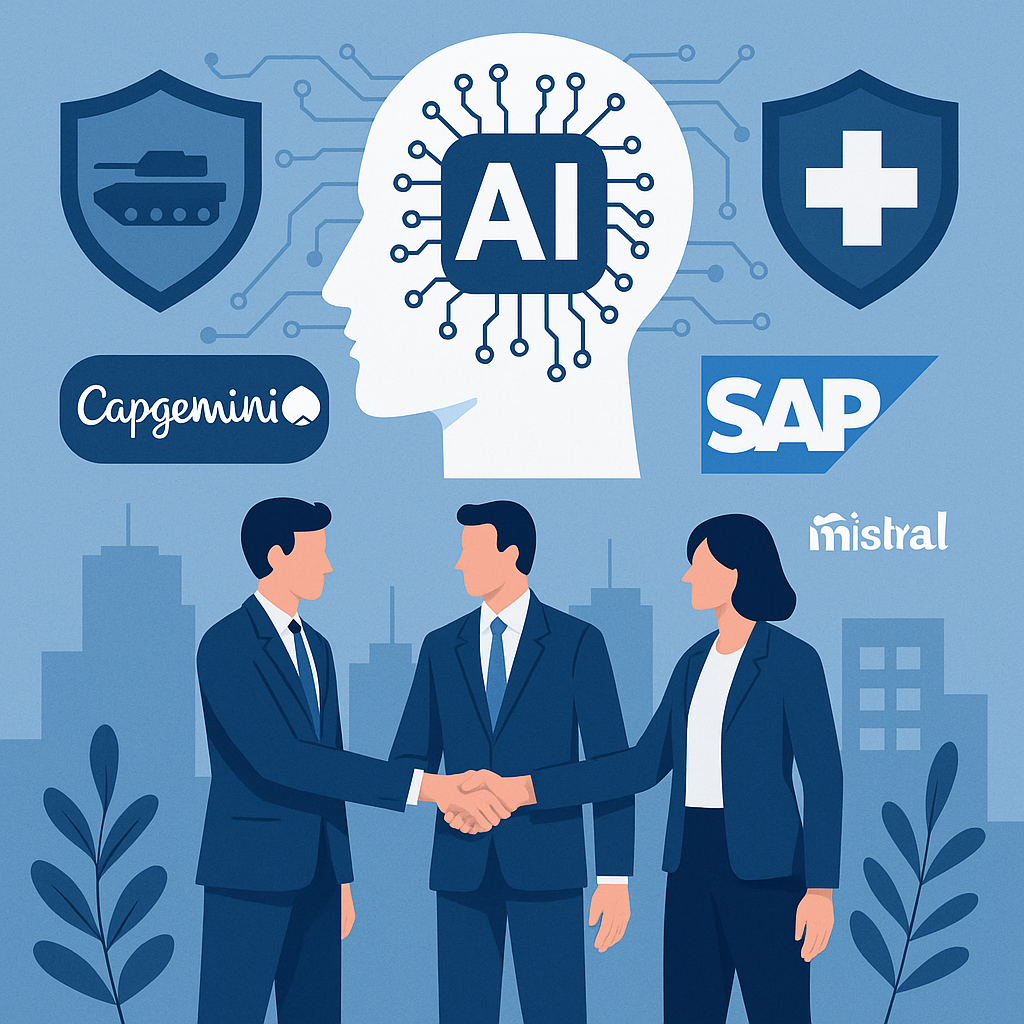As artificial intelligence continues to reshape the global economy, a powerful new alliance between European tech giants Capgemini and SAP, alongside the fast-rising French AI startup Mistral, is sending ripples through the investment world. The trio’s announcement of a strategic partnership to deploy AI in sensitive sectors—most notably defense and healthcare—marks a pivotal step in the broader commercialization of AI in highly regulated environments.
This development arrives at a time when investor interest in applied AI is surging, especially across mission-critical domains that demand not only innovation, but also reliability, security, and compliance.
Why This Deal Matters to Investors Now
The partnership taps into one of the fastest-growing segments in the AI landscape: regulated sector applications. According to a recent McKinsey report, AI adoption in healthcare and defense is expected to grow at a CAGR of over 30% through 2030, driven by rising demand for automation, data-driven diagnostics, predictive modeling, and national security modernization.
Capgemini—a major global player in consulting and IT services—will lead the integration of Mistral’s generative AI models into enterprise and public-sector systems. SAP, whose enterprise software dominates back-end infrastructure across Fortune 500 companies, will help embed these AI solutions within large-scale systems, particularly in hospital networks and defense contractors.
Mistral, known for its open-weight large language models and recent success in challenging the dominance of OpenAI and Google DeepMind in Europe, brings a level of innovation and agility that complements the reach and reputation of its two larger partners.
According to Reuters, which first reported the alliance on May 26, this collaboration is designed to balance AI performance with transparency and explainability, two features crucial in regulatory environments.
Inside the Sectors: AI’s Role in Defense and Healthcare
In defense, AI technologies are being used for threat detection, logistics optimization, and battlefield simulations. Governments across Europe and North America are investing heavily in AI to modernize defense systems, often with a strong emphasis on sovereign AI capabilities.
In healthcare, AI is already showing promise in clinical decision support, personalized medicine, and administrative automation. According to PwC, AI can potentially save the U.S. healthcare system over $150 billion annually by 2026 through automation of administrative tasks and early disease detection.
This new partnership is strategically positioned to capture both markets. By targeting these sensitive yet lucrative sectors, Capgemini, SAP, and Mistral are not just building new product lines—they’re paving the way for broader AI adoption in spaces where compliance, ethics, and trust are non-negotiable.
Strategic Implications and Market Positioning
From an investment lens, this partnership signals two critical shifts:
- European Sovereignty in AI: With Mistral gaining national and EU-level backing as a homegrown alternative to U.S.-based OpenAI, this partnership reinforces the EU’s push for technological self-reliance. The collaboration could draw funding under the EU’s €43 billion Chips Act and AI Act, which prioritize transparent, secure AI systems for critical infrastructure.
- Enterprise AI Maturity: Capgemini and SAP are betting that enterprises in sensitive sectors are ready to move beyond experimentation and into deployment. This suggests that AI revenues may soon transition from pilot-stage hype to recurring income, a shift investors should closely watch.
Analyst and Market Reactions
While the full financial terms of the partnership have not been disclosed, early market sentiment has been positive. SAP shares rose modestly on the Frankfurt exchange following the announcement, while Capgemini saw increased institutional activity on the Euronext.
Industry analysts from Forrester Research and Gartner see this move as indicative of a larger trend: legacy software and consulting firms partnering with agile AI startups to bridge the innovation-execution gap.
Key Investment Insight
Investors should track public and private firms deploying AI within regulated sectors. Companies like Palantir (NYSE: PLTR), Siemens Healthineers (ETR: SHL), and Thales Group (EPA: HO) are already leveraging AI in sensitive applications and may benefit from a wave of follow-on contracts or partnerships.
Furthermore, Mistral’s rise underscores the growing value of open-source and sovereign AI models in Europe. Venture capital and institutional investors seeking exposure to next-gen AI may consider funds or ETFs focused on AI infrastructure, cybersecurity, and enterprise integration.
This strategic alignment between Capgemini, SAP, and Mistral illustrates the maturation of AI as not just a Silicon Valley phenomenon, but a cross-continental, industrial-grade solution capable of reshaping critical systems. As regulatory clarity improves and enterprise adoption accelerates, the door is wide open for investors to benefit from this tectonic shift.
For more in-depth insights on AI, market trends, and emerging tech plays, stay connected with MoneyNews.Today—your trusted source for investor intelligence.





